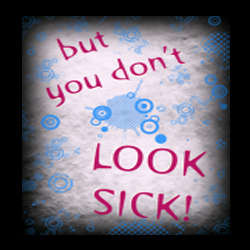Is Mental Illness Really an Invisible Disability?

We have heard this before: Mental Illness is an invisible disability. But I beg to differ. When my world crashes and burns, when the winter steals away my stability and I am hiding within the walls of my home and cannot figure out how to eat or sleep, I'm pretty sure my mental illness is not invisible. In fact, I feel like I am wearing a large sign: "I have bipolar disorder and am currently depressed. PLEASE LEAVE ME ALONE." Mental illness disabilities aren't always invisible.
Physical Illness vs Mental Illness As An Invisible Disability
Note: I am not discounting physical disabilities and I want to point out that mental illness causes physical disability for numerous reasons, such as side-effects from medication and the impact of mood instability on our bodies. Alternatively, struggling with physical disabilities can cause mental illness. But the stigma surrounding mental illness can make those of us who live with it feel as if we need to hide our illness, the symptoms of it, even when things are not going well.
Is Mental Illness Truly An Invisible Disability?
 Hiding our mental illness, the symptoms of it, is not always possible. A severe depressive episode is crippling and I am fairly certain that when I am having a conversation with someone in this state of mind, my illness is visible. They probably cannot pinpoint what it is--it is not blatantly obvious like a broken leg is--but my behavior is different.
Hiding our mental illness, the symptoms of it, is not always possible. A severe depressive episode is crippling and I am fairly certain that when I am having a conversation with someone in this state of mind, my illness is visible. They probably cannot pinpoint what it is--it is not blatantly obvious like a broken leg is--but my behavior is different.
When you live with a chronic mental illness and you are not stable, it becomes difficult to explain to people what is wrong. If I were limping and I was asked what happened, I could come up with an easy answer, but when I am asked why I am so quiet, well, I'm not sure what to say. I could say: "I'm experiencing a severe depressive episode."
Does this sound appealing? Not on my end. This, in my opinion, is how a physical illness differs from a mental illness. Both can be visible but it's more difficult to explain a mental illness.
Should You Tell People You Have a Mental Illness?
This is an entirely different topic I will explore in a separate blog but it's relevant to this topic and it's a complicated situation---a complicated conversation. It's easier to tell people we love; they usually notice when we experience symptoms of relapse. It's much harder to tell people we don't know as well. Mental illness can be invisible: when we are doing well, it's unlikely we act any different and when we are struggling it might also be hard for people outside of our inner circle to notice larger changes.
Whether or not we disclose information is up to us. If our behavior reflects our illness in a negative way, perhaps in the workplace, we might want to speak to someone. In summary: Mental illness can be an invisible disability but I'm not sure it should be.
APA Reference
Jeanne, N.
(2012, September 27). Is Mental Illness Really an Invisible Disability?, HealthyPlace. Retrieved
on 2026, January 23 from https://www.healthyplace.com/blogs/recoveringfrommentalillness/2012/09/is-mental-illness-really-an-invisible-disability
Author: Natalie Jeanne Champagne
Performance on work front need to be based on objective assessment not on assumpption that some body has mental illness ie invisible unlike physical injury.Mind and Mental aspects are still mystery till date,nobody in the world could explain this secret.Hence there is no such thing like mental illness if you can not prove it objectively in behaviour/performance.
Mr Ramesh Kumar Sharma
Like Physical Conditions as diabetes hypertension etc mental health conditions need long term medical treatment and are caused by imbalance of brain chemicals or harmones, there is no difference in that aspect.But mental health sufferers have to face Stigma since there is no body in the world who does not have psychological problems.
Mr Ramesh Kumar Sharma.
Performance on work should not be based on subjective assessment even if somebody takes psychiatric drugs to keep him healthy.
Mr Ramesh Kumar Sharma
Yes, people think that if I am depressed they think I'm a little baby trying to seek attention. They say you look fine to me, I know better than that.
I used to think that no one could see my mental illness. But as I've gotten older, I've come to realize that people can indeed see the changes in my behavior as my moods swing, and while they might not (or they might) think "bipolar", they know something is wrong.
It's not just depression that's obvious, but the irritability and the mania. I see now that my behavior during mania is seen by others as a bit bizarre and even reckless.
To explain the objectivity of mental illness exhibits many enigma both from experts of mental care system and from psychiatric patients.Furthermore, this contestable issue determines the world-out-look of community with great impact in the course of concrete mental disorder. Indeed the symptoms of any mental illness aren't objective, and they manifested up in implicit way by daily global life functioning, which one is impaired. This compromised functioning is really visible, particularly when psychiatric patient should to deal with others anywhere and in any time. as a clinical psychiatrist, I suggest to be openly toward objection of other to ours conduct daily disarray. The same warn us on time on ours psychics defect that ought to evaluate from psychiatrist in order to prevent the development of any serious mental illness. Unfortunately,we are inadvertent to others comments permitting the mental disorder to damage ours psychic apparatus in desperate level. In consequence, we ought to be vigilant to others remarks, in order to perceive really both our psycho-social statement and the intrigued reality. The real approach on the other hand is crucial condition to have an healthy mental state, which one is keep under observation of social milieu. Definitively, mental illness is visible through looking of someone in oneself face, because self criticism as phenomenon is often disguised observation.
This is a good post. I think sometimes when things get really bad, some of us think we are hiding it better than we are. But mostly, what is visible is the effects of the illness- the breaking of social commitments, the messy house, the poor work performance. Not the illness itself.